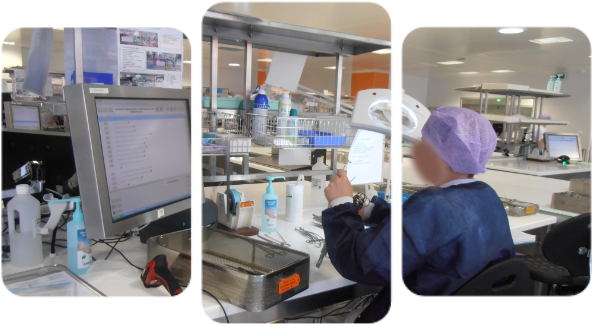Control and assembly of reusable medical devices takes place after cleaning and disinfection.
Cleaned/disinfected RMDs are assembled without delay. If this is not possible, they are temporarily stored in a clean cart for example.
Controls (i.e., visual checks, technical functional tests, or both) are done before and after assembly of multi-component RMD’s or RMD compositions (for example surgical sets).
Medical devices subject to control can be items which were used on a patient but also new devices or devices returned from repair.
The control and assembly workstation is adapted to needs (e.g. surface and light) (see facility air & water)
Controls and assembly of multi-components RMD’s, and RMD composition consider RMD manufacturer instruction for use (IFU)
Assembly of surgical sets are prepared in partnership with medical or surgical users. Agreed instructions specify:
- The items belonging to the set and quantity of each item
- The type of tray (mesh, perforated, thermoformed) and size (large enough to permit equal distribution of weight and metal mass)
- As needed, the arrangement and protection accessories to be used (e.g., protection of sharp and fragile items, wedges to avoid shift or shocks during transport tray liners, etc.)
- As needed, the position of an RMD, as required for safe extraction at point of use
The following general rules apply:
- Heavy instruments are placed in such a way that they will not damage more delicate items.
- Items with concave surfaces broad, flat surfaces, or both, which may retain water are placed on edge.
- For RMD’s with lumen, lumen ports are open.
- Hinged instruments are sterilized in a closed or open position (according to hospital policy). Hinged Instruments with ratchet locks are fully open or locked up to the first notch (according to hospital policy). If instruments (hinged and hinge with rackets) are fully open, a description of the accessories required to keep the instruments in the open position is provided.
Instrument identifiers and visuals assist the assembly of complex sets.
It is verified that:
- Certificate of compatibility of the arrangement and protection accessories with the intended sterilization cycle are available.
- Sterilizing agent has free access to all RMD surfaces. Tip protectors, if used, must be permeable to the sterilizing agent, fit loosely, and are used according to the manufacturer’s written IFU. Only approved accessories are used.
- The weight does not exceed applicable occupational health and safety limits (maximum weight of an item, including packaging varies between 10 kg and 11 kg (25 lb) according to each country’s guidelines)
For basin sets, all basins are in the same direction and processed with lint-free, absorbent material between nested basins.
For textile, the product manufacturer is consulted for recommendations on the pack size, dimensions, and density that have been validated for the intended steam sterilization cycles. A pack is prepared with freshly laundered textiles.


